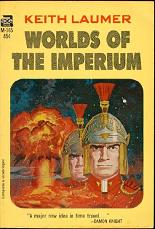
Worlds of the Imperium
Keith Laumer
124 pages
published in 1962
As I've said before, Keith Laumer was one of my favourites when I first started reading science fiction. I would never accuse him of being a particularly brilliant writer, but he has a knack for writing gripping, fast-paced adventure science fiction. Laumer writes in a sort of polished pulp style, with loner heros relying on their native brawn and brain to solve the predicaments their superscience weapons cannot help them with. There's a hint of sex, though nothing beyond noticing the graceful curves of a passing female. The best mainstream author I could compare Laumer to would be John D. MacDonald.
Worlds of the Imperium is a good example of Laumer's style. It's the first in a series of three novels starring Brion Bayard, secret agent of an British-German-Swedish empire that spans several dozen parallel earths, a much more benign empire than that imagined by H. Beam Piper. The other two novels are The Other Side of Time and Assignment in Eternity and all three of them have been published in a omnibus edition by Baen Books. A fourth novel, Zone Yellow was written long after Laumer had had the stroke that robbed him of his writing abilities and by all reports is ... not good.
At the start of Worlds of the Imperium Brion is not yet a secret time agent, but a minor US diplomat on our earth, stationed in Stockholm, visiting the medieval old town when he noticed he's being shadowed. Trying to shake off his shadow, he runs into a trap and is caught and drugged. He wakes up in a some sort of moving vehicle, is interrogated as to his life and the political situation of the world, but in terms that make no sense. When he manages to get his hands on one of his captors' guns and orders them to stop, they reply its impossible because they're in the middle of the Blight and become agitated when he exists. It's only then that they reveal the truth: that they are agents of the Imperium, which has learned of how to move across timelines, but that the secret of this is so complicated and dangerous that almost every other timeline nearby has been destroyed in one way or another. Only two other nearby timelines survived, one of which is Brion's own.
It's the other surviving timeline that's the problem, as after the Imperium contacted it to open trade relations, its emissionaries were tortured and killed and not much later raids from this timeline on the worlds of the Imperium started, in which atomic bombs were used... To deal with this problem, Brion was recruited. Because the dictator ruling this world devastated in more than a century of continuous warfare is none other than an alternate version of himself. If Brion can kill and replace his double, he can take over and stop the raids, to the mutual benefit of both worlds.
Things move quickly from there, with several plot twists that make Brion's task less easy than it looked on paper. Laumer is somewhat of a specialist in cramming convoluted but plausible plots in a limited number of pages, which is something modern authors could learn from. Of course this does come at the expense of characterisation. Only Brion's character is fleshed out to any great depth, with the rest of the cast, both heroes and villains being a bit twodimensional, stock characters. In the context of the fast-paced plot, this doesn't matter. If you like a good adventurous science fiction yarn, you could do worse than to buy that Baen omnibus I mentioned before.
Read more about:
Keith Laumer,
Worlds of the Imperium,
science fiction,
book review